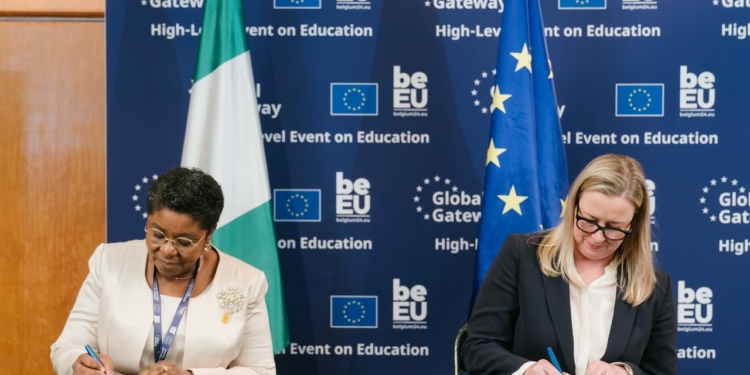- Six Nigerian universities have secured €27 million in EU funding for educational projects under the Youth Mobility for Africa initiative
- The funding aims to enhance learning mobility and develop green and digital skills, aligning with global education and technology trends
In a significant development for Nigerian higher education, six universities in the country have secured access to €27 million in funding from the European Union. This funding is part of the 15 Intra-Africa Mobility Scheme Projects under the Youth Mobility for Africa initiative.
The agreement, signed by Mrs. Didi Esther Walson-Jack, the Permanent Secretary of the Federal Ministry of Education, during the Global Gateway High-Level Event on Education in Brussels, marks a pivotal moment for these universities. The transformative initiative promises substantial support for their educational endeavours.
According to a statement released by Folasade Boriowo, the Director of Press & PR at the Federal Ministry of Education, the European Union has earmarked €27 million for investments in the education and healthcare sectors across Africa. Each of the six selected projects under the Intra-Africa Mobility Scheme will receive €1.8 million.
To be spearheaded by various Nigerian universities, these projects aim to bolster learning mobility for students, trainees, and staff continent-wide. They particularly focus on fostering high-level green and digital skills, aligning with global trends in education and technology.
Among the participating Nigerian universities are the University of Lagos (UNILAG), which will oversee the CB4EE and GREEN STEM projects, and the University of Port-Harcourt, which will lead the CREATE-Green Africa project. Ebonyi State University will also manage the GENES II and ORPHAN projects, while the Federal University of Technology and the University of Nigeria will collaborate on the HCE Solutions project.
This collaborative effort among universities underscores a shared commitment to advancing education and skill development throughout Africa.
Furthermore, the European Union’s Commissioner for International Partnership, Jutta Urpilainen, unveiled the Africa-Europe Youth Academy as part of the Youth Action Plan in EU external relations. This initiative offers formal and informal learning opportunities and exchanges for young leaders and fosters networks between Africa and Europe.
In parallel, Nigeria stands to gain from the regional Team Europe Initiative on Opportunity-driven Skills and Vocational Education and Training in Africa. This initiative, recently launched, will align vocational training initiatives at the country level with employment opportunities stemming from investments made through the Global Gateway program.










Discussion about this post